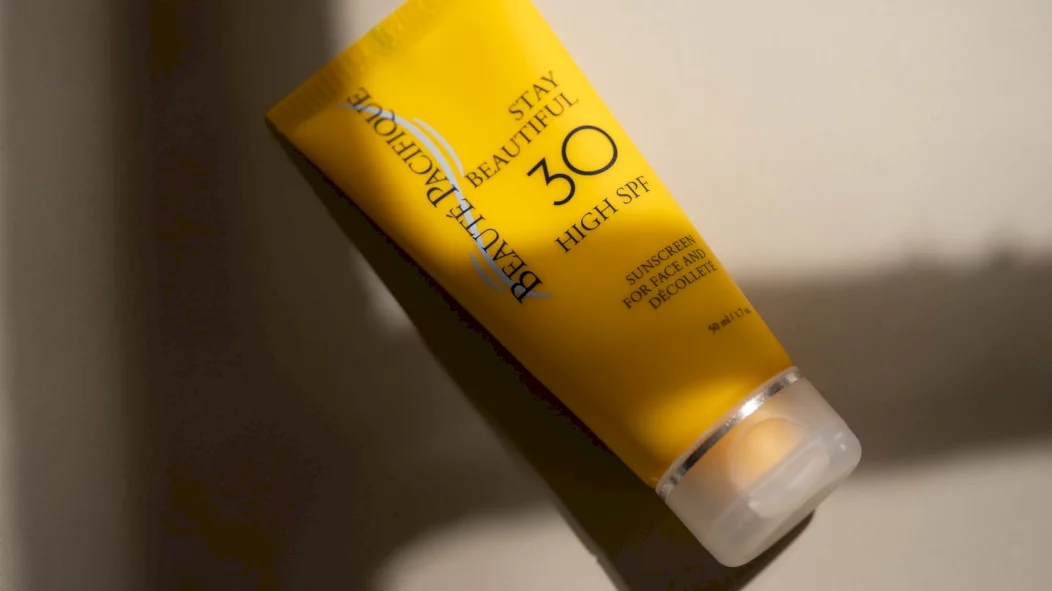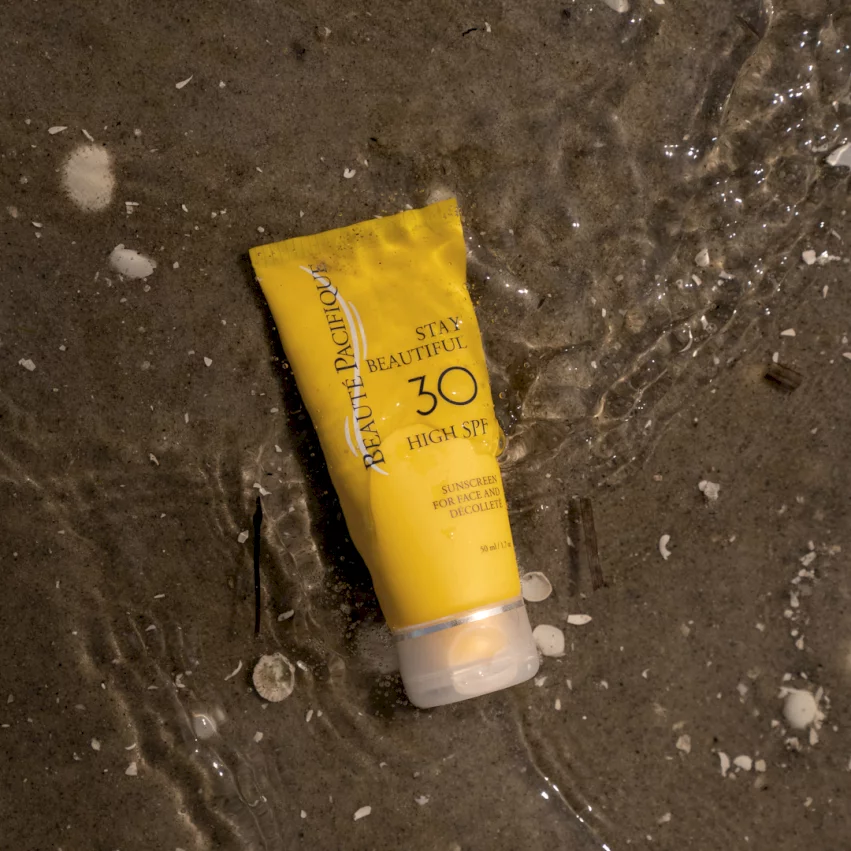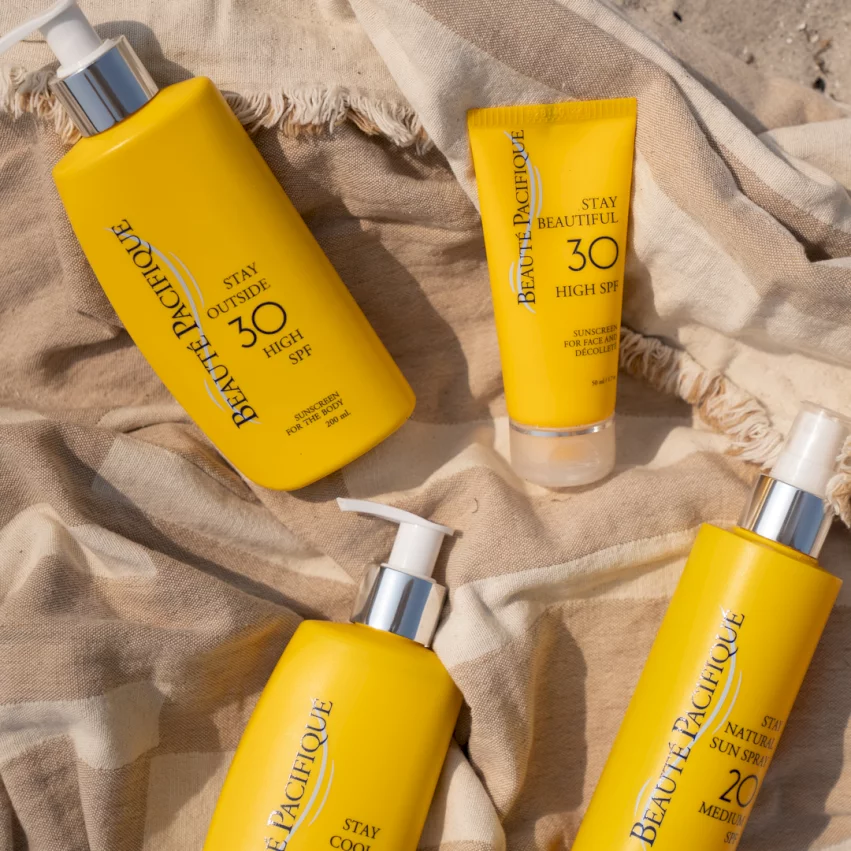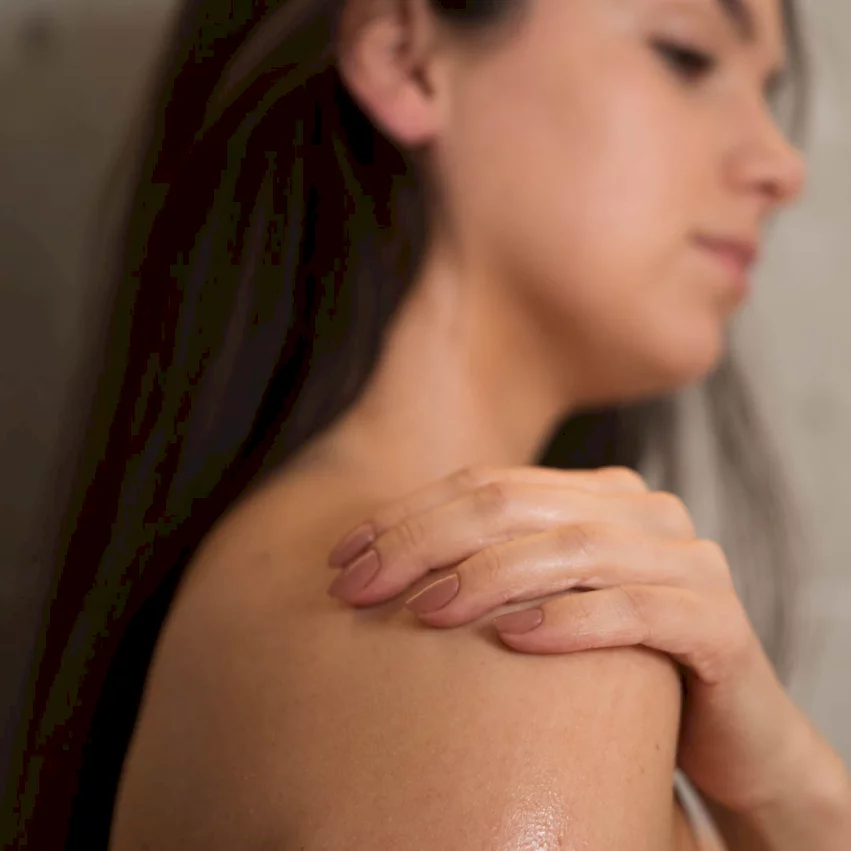Summer, sun, sunscreen and sun knowledge
The sun is shining, the sky is blue and we’re off to enjoy the warmth of summer. After a cold winter and an ever-fluctuating spring, we flock to the streets, parks, beaches and festival grounds as soon as summer arrives.
And of course, with sun and summer comes… sun cream! Already in late spring, the UV index climbs up to where we need to protect our skin to avoid burns and sun damage.
Every year we get a number of questions about sunscreens and their use, so we’ve put together a short guide for you.
The UV index – when should I protect myself?
UV index overview:
1 – 2: Low
3 – 5: Medium
5 – 7: High
8 – 10: Very high
11 +: Extremely high
When the UV index is 3 and above, you should use sun cream and follow the recommendations of the Danish Health Authority to seek shade and wear a sun hat/light clothing to protect your skin, especially between noon and 3pm when the sun’s rays are strongest.
Which SPF should I use?
SPF stands for Sun Protection Factor, and there are several things to consider when choosing a sun protection factor, such as:
- How long and how much time should you spend in the sun?
- During which period of time?
- Where are you located – direct sun, in the shade etc.
- Is it sunscreen for the face or sunscreen for the body?
Of course, the choice of sun protection factor also depends on your skin type. If you have fair and sensitive skin, you may need to use factor 30 – 50.
The SPF number is an indication of how much longer the skin is protected from turning red than if the skin is not protected by sunscreen. This means that by using SPF15, you multiply the time it would normally take you to get burnt in the sun by 15 – in principle, you will be able to stay in the sun 15 times longer before you get burnt.
It is of course only indicative!
Of course, it also depends on the time of year, the UV index, the amount of sunscreen you use, whether you are swimming, sweating or covered by clothing.
What do the sun’s rays do to us?
The sun is hard on the skin, not just on the surface with a sunburn but in all its layers.
The sun’s UV rays can cause deep and invisible damage to the lower layers of the skin and are one of the main causes of premature skin ageing. Exposure to the sun’s rays can cause sun damage, which is when the skin has been exposed to the harmful effects of the sun for several years. This sun damage is often seen in people with fair skin, as they are more prone to sunburn, but of course sun damage can happen to anyone.
We are affected by sunlight throughout our lives. We ‘accumulate’ over the years and therefore years of sun exposure to the skin will have consequences. If only we started from scratch every year, but we don’t, which is why it’s important to protect yourself with sun cream throughout your life.
How much sunscreen should I use? (Amount)
Better too much than too little.
The rule of thumb is one handful to one body; a child’s handful for a child’s body and an adult’s handful for an adult’s body.
How often should I apply sunscreen?
Approximately every 2 – 3 hours. It again depends on whether you have sweated a lot, whether you have bathed and dried yourself with a towel, how much sunscreen you have used, etc.
How long before does it need to be applied
It is recommended that you apply sunscreen on approx. 20 minutes before going out in the sun.
It would be great if you can apply the cream twice, 20 minutes apart. This increases the likelihood that your whole body will be covered.
In what order should I use sunscreens and creams
You should use your creams exactly as you normally would. Cleanse, serum, day cream and then the sunscreen at the end.
If you use a moisturiser with SPF, use it in the same order.
UVA and UVB rays
You’ve probably come across the terms UVA and UVB rays before in relation to sun protection, but what exactly do they mean?
UVA rays: The longest rays from the sun that strike deep into the skin. We are exposed to UVA rays all year round, even on grey days. They are very strong and even affect us through window glass, for example when you are in the car.
UVA rays are the ones that can cause long-term changes to skin cells, causing:
- Sun allergy
- Development of skin cancer
- Pigmentation changes
- Photo-ageing (skin becomes flabby and wrinkles appear)
UVB rays : Short rays that we are struck by when the sun is out. It is this type of sunlight in particular that risks turning us red or burning us.
Unlike UVA rays, UVB is blocked by clouds and glass, for example, but can still penetrate the epidermis. It is UVB rays that give the skin its brown colour, but they can also cause burns, allergic reactions and skin cancer, so it is still important to protect yourself from UVB rays.
You should always choose sunscreens that protect against both types of rays.
How long does sunscreen last?
Unopened, our sunscreens can last up to 3 years. They should be stored in a dark and not too hot place.
Once opened, the product can keep for a minimum of 1 year; probably longer.
If the sunscreen is left in the sun or, for example, in a very hot car for a long time, it will slowly lose its effectiveness.
If the smell, consistency or colour changes, the product should always be discarded.
How does sunscreen work?
Sunscreen works by filtering or reflecting away the sun’s dangerous rays.
There are two types of filters: the physical filter, which is on top of the skin, often with a whitish tinge, reflecting the rays away, and the chemical filter (which is not dangerous), which penetrates the outermost layer of the skin and filters out the UV rays so they cannot penetrate and cause damage.
Meet our sun series: STAY
Our sun series consists of four unique products: Sunscreen for the face and décolleté, sunscreen for the body, sun oil for the face and body and after sun lotion. All products are carefully developed to give your skin the best care and protection in the summer sun.
Common to the entire series is the addition of Resveratrol and Procyanides from our special Chilean Grape Seed Extract, which together with vitamin E provide a powerful anti-oxidant effect, protecting the skin from free radical damage.
Both facial sunscreens and body creams are paraben-free sunscreens. They are made with formulations that minimise oiliness, so they can also be used as sunscreens for blemish-prone skin.
Stay Natural: Delicious and soft sun oil with factor 20 that protects against the sun’s rays and reduces age-related sun damage to the skin. The sun oil can be used on both the face and body, so it’s great to keep in your bag.
It contains a biomimetic peptide which stimulates the skin to produce more melanin pigmentation – the skin’s natural tanning process – as a defense against the sun. So you increase the possibility of a beautiful glow while protecting your skin.
It is a spray sunscreen that makes the oil easy to apply. Note that many people do not apply enough product when it is sprayed, so apply several times and at regular intervals for optimal protection. Stay Natural protects against UVA and UVB rays.
Stay Beautiful: Luxurious and comfortable facial sunscreen with factor 30. Stay Beautiful contains powerful anti-oxidants that help to delay the signs of ageing in the skin. Together with the high SPF, which protects the skin from sunburn and damage, you get a double anti-ageing effect. It also contains Glycerin to keep the skin moisturised. It helps make Stay Beautiful the best sunscreen for the face – if you ask us.
The sunscreen contains chemical filters that prevent whitening, making it the best bet for a non-greasy sunscreen (if it had a physical filter, it would produce the white layer on the skin that most people recognise from childhood).
Stay Beautiful protects against both UVA rays and UVB rays.
Stay Outside: Moisturising and effective protective sunscreen for the body with SPF 30. The sunscreen protects against both UVA and UVB rays and prevents sunburn. Applying sunscreen on your body significantly reduces the risk of sun damage and means your skin stays smooth and supple for longer.
You need more sunscreen than you might think – if in doubt, you probably haven’t used enough.
Stay Cool: The most beautiful aftersun. Stay Cool is both cooling and soothing for sunburned skin, which will immediately feel the soothing relief of Liquorice Root extract.
It’s so important to make sure your skin gets the best possible care if you have an accident – and even if you haven’t had an accident, but you’ve still been ‘kissed’ by the sun. The skin needs moisture, and this aftersun helps with that by using vitamins C and E, Squalane and Glycerin.
Bonus! Our aftersun lotion contains Menthyl PCA, which gives it a cooling effect and acts as a mosquito repellent!







